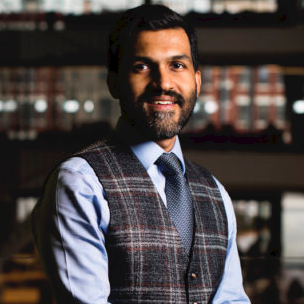This two-part talk describes a data- and systems-centric approach to enable emerging applications for the Internet of Things (IoT) paradigm in the context of (i) sensor fusion in vehicles and (ii) security in terms of device authentication. In the first part of the talk, we explore how contextual knowledge of the environment, obtained from vehicle-mounted LiDAR, camera and GPS sensors can expedite the creation of high bandwidth millimeter wave links in autonomous cars. We describe fusion models that combine these diverse data sources as well as multi-modal federated learning to lower millimeter wave beam selection time compared to what is possible via the standard today. The second part of the talk addresses the challenge of authentication, where thousands of wireless devices may operate in untrusted environments. This is accomplished at the physical layer by learning subtle but discriminative distortions present in the transmitted signal, also called as RF fingerprints. Deep convolutional neural networks (CNNs) combined with data augmentation, both with and without receiver feedback, are used to demonstrate 99% identification accuracy in these large radio populations. For each of these two use cases, we also describe our experiences with the cross cutting component of data collection, involving community-scale NSF platforms for advanced wireless research (PAWR) to the world largest RF emulator- Colosseum, and finally, real-world autonomous vehicle testbeds. In closing, we summarize ongoing efforts to democratize access to wireless datasets, create tools and software APIs to create such datasets, and design learning resources at all levels to advance the use and sharing of RF data.

Kaushik Chowdhury is Professor in the Electrical and Computer Engineering Department, Associate Director of the Institute for the Wireless IoT at Northeastern University, Boston and co-PI on The Ohio State University-led NSF AI-Edge Institute from Northeastern. He is the winner of the U.S. Presidential Early Career Award for Scientists and Engineers (PECASE) in 2017, the Defense Advanced Research Projects Agency Young Faculty Award in 2017, the Office of Naval Research Director of Research Early Career Award in 2016, and the National Science Foundation (NSF) CAREER award in 2015. He is the recipient of best paper awards at IEEE GLOBECOM'19, DySPAN'19, INFOCOM'17, ICC'13,'12,'09, and ICNC'13. He serves as area editor for IEEE Trans. on Mobile Computing, Elsevier Computer Networks Journal, IEEE Trans. on Networking, and IEEE Trans. on Wireless Communications. He co-directs the operations of Colosseum RF/network emulator, as well as the Platforms for Advanced Wireless Research project office. Prof. Chowdhury has served in several leadership roles, including Chair of the IEEE Technical Committee on Simulation, and as Technical Program Chair for IEEE INFOCOM 2021, IEEE CCNC 2021, IEEE DySPAN 2021, and ACM MobiHoc 2022. His research interests are in applied machine learning for wireless communications and networks, data-centric IoT architectures, large-scale experimentation, and networked robotics

